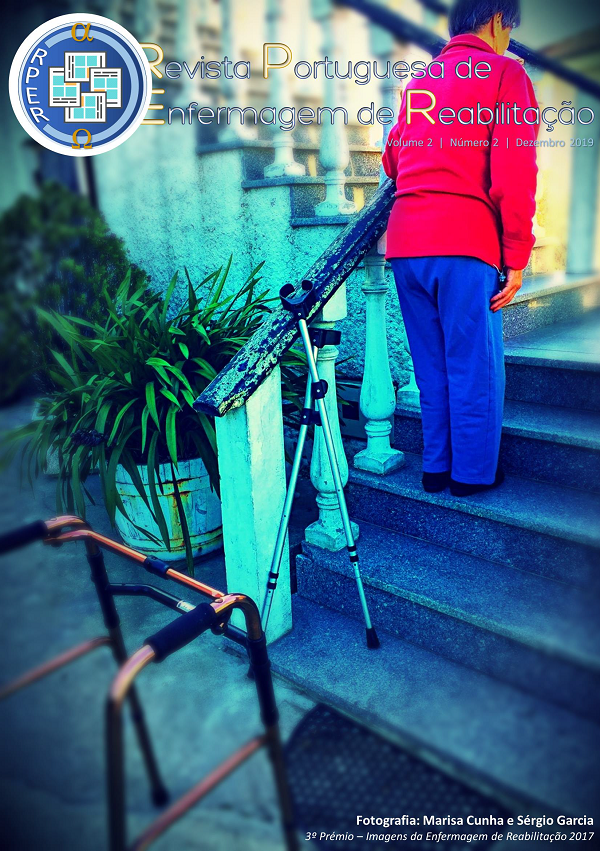Abstract
A multisensorial stimulation programme (MSP) was implemented in patients with severe changes in their awareness disabilities, created and implemented with the main purpose of improving the quality of nursing care. “Assessment and stimulation in patients with major disabilities in their cognitive ability “(1). Our objective with this programme was focused on promoting a clear enhancement in patients’ cognitive ability and awareness.
This programme was applied to 22 people/ participants with an average age of 57,95 years old (+ 17,27), being 63,64% male patients. The majority of the patients included the ones affected by hemorrhagic stroke (59,09%), followed by brain traumatic injury (31,82%). The two chosen methods were: the Glasgow Coma Scale (EGC) as well as Rancho los Amigos Levels of Cognitive Functioning Scale (LCSF) to assess patients.
After the data analysis, the results were as follows: more than a half of the patients showed a clear improvement in their cognitive awareness, 63,64% increased the EGC score and 54, 55 in the LCSF. The patients whose families were effectively involved in the programme improved six times more in the EGC average.
We have come to the conclusion that the introduction of our multisensorial programme led to an improvement in most of these patients.
References
Varanda E, Rodrigues CA. Avaliação e estimulação do doente com alterações do estado de consciência: Projeto de melhoria contínua da qualidade dos cuidados de enfermagem. Ordem dos Enfermeiros. 2015. Disponível em: https://www.ordemenfermeiros.pt/arquivo/projectos/Documents/Projetos_Melhoria_Qualidade_Cuidados_Enfermagem/HospitalGarciaOrta_AvaliacaoEstimulacaoDoenteComAlteracoesEstadoConsciencia.pdf
Demertzi A, Laureys S, Bruno A. Ethics in Disorders of Consciousness. Jl Vincent(ed.), Annual Update in Intensive Care and Emergency Medicine. Springer. 2011.
Laureys S, Owen AM, Schiff N. Brain function in coma, vegetative state, and related disorders. Lancet Neurol. 2004; 3: 537-546. Disponível em: http://www.coma.ulg.ac.be/papers/vs/PVS_MCS_LIS_LancetN04.pdf
Giacino JT, Ashwal S, Childs N, et al. The minimally conscious state: Definition and diagnostic criteria. Neurol. 2002; 58: 349-353. Disponível em: https://pdfs.semanticscholar.org/21d1/d1961a0496ad1edc7ccbd471e93025a15459.pdf
Royal College of Physicians. Prolonged disorders of consciousness. National clinical guidelines. London. RCP Rev. 2018.
Cabral FA, Pompeu SM, Apolinário A, Pompeu JE. Estimulação Multissensorial em pacientes comatosos: uma revisão da literatura. Revista o Mundo da Saúde. São Paulo. 2008; 32 (1): 64-69.
Hoeman S. Enfermagem de Reabilitação: Aplicação e processo. (2ª Edição). Loures: Lusociência. 2000: 635-184.
Taylor J. O dia em que a minha vida mudou. Lisboa: Editorial Presença. 2008.
Monteiro A, Oliveira C, Pereira C, et al. A oculta face do coma: o despertar do desconhecido. Loures: Lusociência. 2013: 31-37.
Varanda E, Rodrigues CA. Reeducação cognitiva em Enfermagem de Reabilitação: Recuperar o Bailado da Mente. In C. Marques-Vieira, L Sousa (Eds). Cuidados de Enfermagem de Reabilitação à pessoa ao Longo da vida. Loures: Lusodidacta. 2017: 219-221.
Hoeman S. Enfermagem de Reabilitação: Prevenção, intervenção e resultados esperados. Loures: Lusociência. 2011: 556
Simões J. A influência da estimulação auditiva na pessoa em coma. Universidade de Aveiro. 2011.
Rancho los Amigos National Rehabilitation Center. Family Guide to The Rancho Levels of Cognitive Functioning. Disponível em: http://file.lacounty.gov/dhs/cms1_218115.pdf.
Pinto V. Coma Provocar a consciência num movimento espiral. Loures: Lusodidacta. 2014.
Sun y, Wang J, Heine L, et al. Personalized objects can optimize the diagnosis of EMCS in the assessment of functional object use in the CRS-R: a double blind, randomized clinical trial. BMC Neurol. Dec;18(1):38. Disponível em: https://doi.org/10.1186/s12883-018-1040-5
Laureys S, Perrin F, Faymonville ME, et al. Cerebral processing in the minimally conscious state. Neurol.2004:63(5): 916-8 https://bmcneurol.biomedcentral.com/articles/10.1186/s12883-018-1040-5
Sharon H, Pasternak Y, Ben S. et al. Emotional processing of personally familiar faces in the vegetative state. Plos One. 2013; 8(9) e74711. Disponivel em:
https://www.ncbi.nlm.nih.gov/pmc/articles/PMC3783455/
Heine L, Castro M, Martial C, et al. Exploration of functional connectivity during preferred music stimulation in patients with disorders of consciousness. Front Psychol. 2015; 6: 1704. Disponivel em: https://www.ncbi.nlm.nih.gov/pmc/articles/PMC4637404/
Doman G, Wilkinson R, Dimancescu MD et al. The effects of intense multi-sensory stimulation on coma arousal and recovery. Neuropsychol Rehabil. 1993; 3:203-12.
Lombardi F, Taricco M, Tanti A, et al. Sensory stimulation for brain injured individuals in coma or vegetative state. Cochrane Database Syst Rev. 2004;(2)
Nolte J. Neurociência. Arizona: Elsevier. 2008: 155.
Freiherr J. Cortical Olfactory Processing. In Buettner A. (Ed). Springer Handbook of Odor. Germany: Spinger. 2017: 764-766.
Caldas AC. A Herança de Franz Joseph Gall. O Cérebro ao serviço do comportamento humano. Lisboa: Mc Graw Hill. 2000: 83.

This work is licensed under a Creative Commons Attribution-NonCommercial-NoDerivatives 4.0 International License.
Copyright (c) 2019 Revista Portuguesa de Enfermagem de Reabilitação
Downloads
| Abstract Views | 1111 |
|---|
| PDF (Português (Portugal)) | 960 |
|---|
| 70 |
|---|





